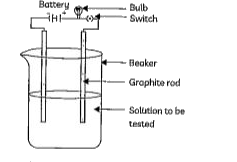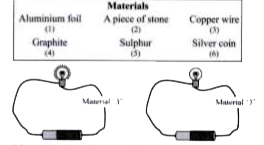Which one of the following material conducts electricity?
diamond
crystalline sodium chloride
barium sulphate
fused potassium chloride
The correct Answer is:D
To determine which material conducts electricity among the given options, we will analyze each material based on its structure and the presence of free ions or electrons.
1. Analyze Diamond:
- Diamond is a form of carbon where each carbon atom is tetrahedrally bonded to four other carbon atoms.
- This structure does not allow for the presence of free electrons or ions.
- Conclusion: Diamond does not conduct electricity.
2. Analyze Crystalline Sodium Chloride (NaCl):
- In its solid state, NaCl forms a rigid lattice structure.
- In this structure, the ions (Na⁺ and Cl⁻) are fixed in place and cannot move freely.
- Conclusion: Solid NaCl does not conduct electricity. (It can conduct when molten due to free ions.)
3. Analyze Barium Sulfate (BaSO₄):
- Barium sulfate is typically found as a solid precipitate.
- Similar to NaCl, in its solid state, BaSO₄ does not have free ions or electrons to facilitate electrical conductivity.
- Conclusion: Barium sulfate does not conduct electricity.
4. Analyze Fused Potassium Chloride (KCl):
- When KCl is melted (fused), it breaks down into its constituent ions (K⁺ and Cl⁻), allowing them to move freely.
- The presence of these free-moving ions enables the conduction of electricity.
- Conclusion: Fused KCl conducts electricity.
Final Answer:
The material that conducts electricity among the given options is fused KCl.
---
- Diamond is a form of carbon where each carbon atom is tetrahedrally bonded to four other carbon atoms.
- This structure does not allow for the presence of free electrons or ions.
- Conclusion: Diamond does not conduct electricity.
- In its solid state, NaCl forms a rigid lattice structure.
- In this structure, the ions (Na⁺ and Cl⁻) are fixed in place and cannot move freely.
- Conclusion: Solid NaCl does not conduct electricity. (It can conduct when molten due to free ions.)
- Barium sulfate is typically found as a solid precipitate.
- Similar to NaCl, in its solid state, BaSO₄ does not have free ions or electrons to facilitate electrical conductivity.
- Conclusion: Barium sulfate does not conduct electricity.
- When KCl is melted (fused), it breaks down into its constituent ions (K⁺ and Cl⁻), allowing them to move freely.
- The presence of these free-moving ions enables the conduction of electricity.
- Conclusion: Fused KCl conducts electricity.
The material that conducts electricity among the given options is fused KCl.
Topper's Solved these Questions
- ELECTROCHEMISTRYBOOK - DINESH PUBLICATIONCHAPTER - ELECTROCHEMISTRYEXERCISE - SELECTED STRAIGHT OBJECTIVE
67 Videos
- ELECTROCHEMISTRYBOOK - DINESH PUBLICATIONCHAPTER - ELECTROCHEMISTRYEXERCISE - MATCH-MATRIX
7 Videos
- ELECTROCHEMISTRYBOOK - DINESH PUBLICATIONCHAPTER - ELECTROCHEMISTRYEXERCISE - ADDITIONAL NUMERICAL PROBLEMS FOR PRACTICE
12 Videos
- D-AND -F BLOCK ELEMENTSBOOK - DINESH PUBLICATIONCHAPTER - D-AND -F BLOCK ELEMENTSEXERCISE - BRAIN STORMING MULTIPLE CHOICE QUESTIONS (MCQS)
13 Videos
- ETHERSBOOK - DINESH PUBLICATIONCHAPTER - ETHERSEXERCISE - (MCQs)
8 Videos
Similar Questions
Knowledge Check
Which one of the following material conducts electicity ?
ADiamondBCrystalline NaClCBarium sulphateDFused KClWhich amongst the following will not conduct electricity?
ANaClBMgCl2CCaF2DC6H12O6Which of the following can conduct electricity in?
AMgBr2BCaBr2CBaBr2DBeBr2
An experiment was performed to test the electrical conductivity of some substances as shown in figure below:

The soluton of which of the following will not conduct electricity?
View SolutionRohit has performed an activity to test whether the following materials conduct electricity or not by putting them in the circuit, one at a time as shown in the figure.

Materials X and Y could be
View SolutionWhich of the following will not conduct electricity ?
View SolutionWhich of the following liquids can conduct electricity in pure state?
View SolutionWhich of the following conducts electricity ?
View Solution
